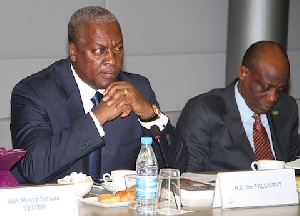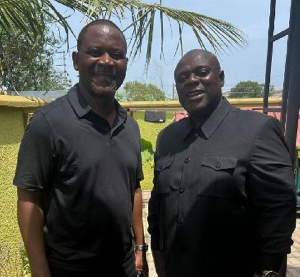- Home - News
- TWI News | TV
- Polls
- Year In Review
- News Archive
- Crime & Punishment
- Politics
- Regional
- Editorial
- Health
- Ghanaians Abroad
- Tabloid
- Africa
- Religion
- Election 2020
- Coronavirus
- News Videos | TV
- Photo Archives
- News Headlines
- Press Release
General News of Friday, 27 May 2016
Source: Daily Guide
Gov’t owes ECG Ghc1bn
Available statistics indicate that government owed the Electricity Company of Ghana (ECG) about GH¢1 billion while individuals and corporate institutions also owed the company a little over GH¢600 million as at the end of 2014.
Government’s indebtedness to the ECG was said to have risen significantly as of April 2016, and that is seriously affecting the operations of the company.
The revelation was made at the sitting of the Public Accounts Committee (PAC) of Parliament yesterday; and the figures given were that the government owes GH¢950 million while private individuals owe GH¢650 million, making a total of GH¢1.6 billion – being trade debt hanging around the neck of ECG.
The Member of Parliament for Bibiani-Anhwiaso-Bekwai and member of the committee, Kingsley Aboagye-Gyedu, asked officials of the ECG, who appeared before the PAC, to answer questions on their financial accounts. He wanted to know why they had those huge trade debts in their accounts books and were still crying for money to sustain their operations. But the officials said they had tried to collect the debts to no avail. Mr Aboagye-Gyedu later told DAILY GUIDE that he was amazed that the government could financially suffocate the ECG to that extent, stressing that its (government’s) call to privatise the ECG does not make sense since it can pay off its debt to the company to make it more viable.
According to him, the company has enough financial expertise to turn things round if its debts are recovered.
“I don’t understand why the government is refusing to pay its debt to the ECG because it can pay,” he noted, adding that the call for privatisation of ECG was another ploy, as in the case of Merchant Bank, for people connected to the government to turn round to buy ECG so that the government would quickly come in to pay off the debt for them.
He charged Ghanaians not to allow the government to privatise ECG because it is financially viable and potentially profitable.
“This call for the privatisation of the ECG is not necessary at all because the government is capable of settling its indebtedness to the ECG to enable it operate more efficiently,” he said.
According to Mr Aboagye-Gyedu, if these debts were settled, the dumsor (erratic power supply) could also be solved.
He, therefore, called on the government to as a matter of urgency settle its debt.
Entertainment










